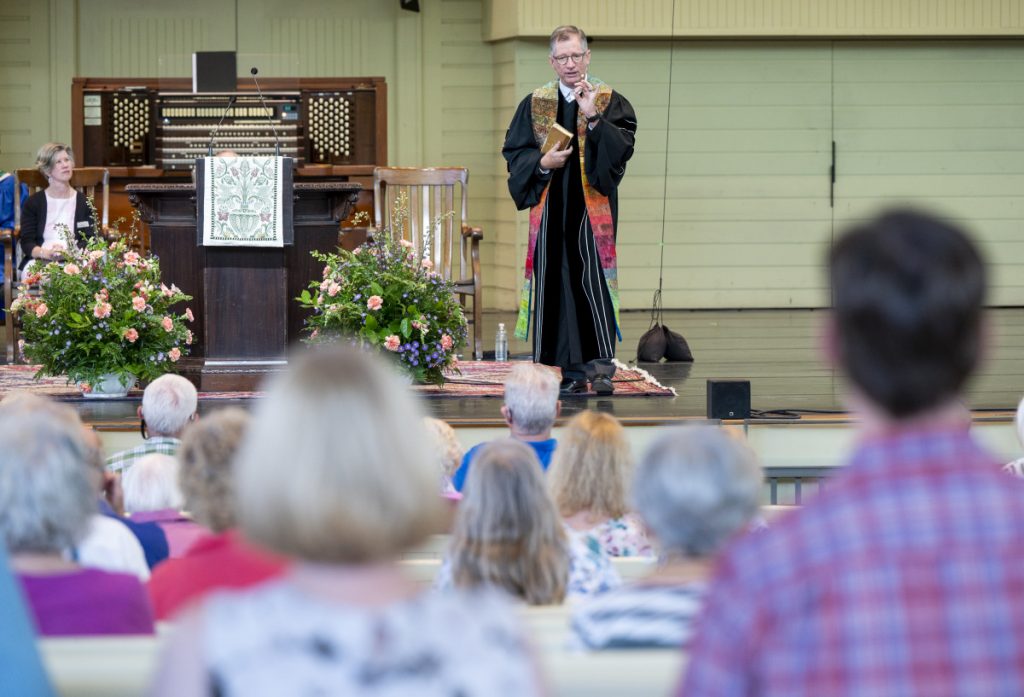MARY LEE TALBOT – STAFF WRITER

“If you were a dying savior, what would you pray for?” the Rev. John C. Dorhauer asked the congregation at the final morning worship service of the 2021 season at 9 a.m. Friday in the Amphitheater. “I know it is a strange question, because we are not saviors, but if you knew your death was imminent and others depended on it, what would you pray for?” Dorhauer’s sermon title was “That They May All Be One,” and the Scripture reading was John 17:20-23.
Jesus knew what was coming, Dorhauer said.
“In four chapters, John 14-17, Jesus had a conversation with the disciples. We can sense how much was at stake. He was going over all of it, because Jesus was saying, ‘After tonight you are on your own.’ It was imperative for the disciples to listen. In Chapter 17, he stops teaching and starts praying. This is the last opportunity for them to get it right before they go out to the ends of the earth.”
Dorhauer took the congregation through Jesus’ prayer, “that they all may be one,” word by word to explain the text. “ ‘That’ means in order that, with the hope that, with the belief that,” he said. “This was a prayer with a purpose, with an intentional outcome.” The disciples had been with Jesus and had seen him preach and work miracles, and they knew he could get anything he wanted, but he said, “I pray that.”
“They,” the next word, does not refer to the disciples, but that the prayer was said on behalf of those who believe through the preaching of the apostles.
“Are we not exactly those for whom he was praying?” Dorhauer asked. What Jesus was asking for is not dependent on individuals, but there is no walking away from being a disciple.
“ ‘May’ is a clear glimpse of God,” Dorhauer said. “Jesus did not say ‘you must,’ ‘you better’ or ‘you ought.’ He said ‘Father, may,’ the language of invitation. Those created in the image of God have a choice in the matter. We must make a choice, but it is an invitation, not a demand.”
Everything in Jesus’ mission and ministry shows the length to which God’s love is offered, Dorhauer said.
“It is offered to ‘all.’ Jesus accepted the prostitutes and tax collectors, not just the righteous. The message was that when God sets the table, all are welcome,” Dorhauer said. “The church wrestled with this concept after Jesus’ death, to be the church of no partiality.”
Dorhauer said to the congregation, “To ‘be’ is not to do anything but be something. Jesus had his fill of people who act one way but are something else. He had his fill of hypocrites. When we ‘be’ something, we embody something. If we become something, what we do will emanate from us naturally.”
Jesus prayed “that they all might be one.” Dorhauer asked the congregation, “Why did he ask for this thing? Why did he pray for it? Jesus knew that once the disciples were sent out, their success would matter to the extent they could show unconditional love for each other. How can you show love to others if you cannot show unconditional love to those aligned with you? Jesus was afraid they could not show love for each other, yet their success depended on being one.”
Dorhauer continued, “How many times have you heard people say they would not be part of a body that talks about love but can’t get along? I am weary of Christians fighting over theology and allowing their theological positions to separate them. I am weary of the disrespect and animosity that follows. It makes our evangelism ineffective.”
In Chautauqua, he said, different churches and religions are all represented and sing and share the joy of vision of the risen Christ. If the whole world were to be like Chautauqua, Dorhauer said, what Jesus believed might be possible.
“My final challenge to you as baptized, confirmed members of the body or as lovers of humanity is to commit to unity that knows no division,” Dorhauer said. “We may not agree on doctrine, but when the table is set, there is a place for you, no exceptions. May the dying prayer of the Risen Christ, that all may be one, be true.”
The Rev. David Shirey presided. The Rev. Susan Cartmell, who has been teaching Special Studies courses this season on reading the Bible thematically in a new way, read the Scripture. For the prelude, Joshua Stafford, Jared Jacobsen Chair for the Organist and director of sacred music, played “Sunset,” by Edwin H. Lemare. Members of the Motet Choir sang “Draw is in the Spirit’s Tether,” with music by Harold Friedell and words by Percy Deamer. The postlude was “Toccata,” from Symphony No. 5 by Charles-Marie Widor, played by Stafford. The Daney-Holden Chaplaincy Fund provided support for this week’s services and chaplain.




